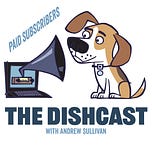Kara is a journalist who has covered the business of the Internet since 1994. She was the cofounder and editor-at-large of Recode, and she's worked for the NYT, the WaPo, and the WSJ. She’s now the host of the podcast “On with Kara Swisher” and the co-host of the “Pivot” podcast with Scott Galloway, both distributed by New York Magazine. Her new memoir is Burn Book: A Tech Love Story. It’s a fun read, and it was good to hang out with her again after many years. We were both web pioneers and it’s good to remember those days of the blogosphere. And we get fiery at times.
You can listen right away in the audio player above (or on the right side of the player, click “Listen On” to add the Dishcast feed to your favorite podcast app). For two clips of our convo — debating how woke the MSM really is, and how readers are smarter than journalists — pop over to our YouTube page.
Other topics: Kara’s rough childhood on Long Island; losing her dad at an early age and contending with a bad stepdad; her military family and her interest in serving; how DADT made things worse for gays; being an AIDS quilt folder; lesbian tropes; our mutual dislike of Pride parades; her fearlessness as a young reporter; The McLaughlin Group; the condescension of legacy media; tycoons who buy media outlets; Jeff Bezos; Marty Peretz; Friendster, Zip2 and Suck.com; how Facebook was seen as a savior for media; how trolls are chagrined when you talk to them; how Zuckerberg is “lovely but awkward” in person; Bill Gates; Peter Thiel; how gay hookups drove the early internet; how the apps kill serendipity; the power of podcasts for community; how the right innovated direct mail and talk radio; Obama’s pioneering with web outreach; how Twitter made January 6 (and Trump himself) possible; Kara watching every single episode of The Apprentice; how Trump’s act is getting stale; how social media is not a good business model; Elon Musk; buying Twitter to “make him more interesting at parties”; the Walter Isaacson bio; Elon’s vile tweets on Paul Pelosi; his trans daughter; ketamine; Mark Cuban on DEI; abortion in the 2024 election; how social media is fracturing and losing appeal with Gen Z; the decline of cable news; the disinfo on unarmed black men killed by cops; how BLM led to more black lives lost; the grievance-industrial-complex of the right; how its reactionaries just want to “burn shit down”; why Kara is a China hawk; why she disagrees with Jon Haidt; the TikTok ban; the Twitter Files; Hunter’s penis; Tipper Gore and dirty lyrics; and how Kara counsels her four kids about social media and porn.
Browse the Dishcast archive for an episode you might enjoy (the first 102 are free in their entirety — subscribe to get everything else). Coming up: Adam Moss on the artistic process, Johann Hari on Ozempic, Nellie Bowles on the woke revolution, Noah Smith on the economy, George Will on Trump and conservatism, Bill Maher on everything, and the great Van Jones! Send any guest recs, dissents, and other comments to dish@andrewsullivan.com. Here’s a rec:
Could you please consider having the anthropologist Emmanuel Todd on your podcast? Christopher Caldwell recently profiled him the NYT: “This Prophetic Academic Now Foresees the West’s Defeat.”
Also, you should consider having on the great Oren Cass.
Oren is coming on this summer. Another rec:
I’m very much looking forward to your (possible) podcast on Oakeshott. A very long time ago, I was talking to John Casey at Caius in his rooms, and he kept referring to some guy named “Oakeshott,” of whom I’d never heard (though of course I did not confess my ignorance). Back in those days, Casey was running the white-tie “Oakeshott Ball” as his own private shindig. I can’t imagine it’s still going. My fondest memory of it was meeting Claus von Bülow, then in the news for certain delicate matters unrelated to Oakeshott.
We just booked the Oakeshott scholar Elizabeth Corey to come on the pod, so stay tuned. A fan of last week’s episode with Eli Lake exclaims: “Another great pod! I am getting addicted to the Dishcast.” Another:
Despite the gruesome details and violent history you discussed, your episode with Eli was an effortless fun listen. What a great guest.
For all his obvious intellectual gifts, though, I was a little surprised that he wasn’t able to rise to your challenge to articulate a case for the anti-Zionist argument, moving almost immediately to “settler colonialism” and the most extreme examples of blood libel. These arguments are sadly mainstream, it’s true. But later in the episode, I think you did a far better job of answering your own question by acknowledging that many Arabic people lost their homes and their homeland. And that’s really the heart of it, isn’t it?
Academic debates and Twitter feuds do focus on the colonial bullshit that Eli referenced, but sifting through that Orwellian newspeak is that painful truth: many Palestinians who were non-combatants in 1948 — and had no say in partition plans — lost the places they grew up in. Places where they made memories with their grandparents. Places they worshipped, played, and learned.
Israel has a right to exist. Even if it didn’t, the world made that choice in the 1940s and we’re not going to undo it. And the resolve Jews have shown through the centuries to survive and return to their homeland after unimaginable persecution is inspiring. But to realize that longstanding dream, other people suffered in turn.
Palestinian leaders like Arafat and today’s academics may mistakenly frame the big picture in colonial terms; and Eli is right that those arguments ignore Jews’ long connection to the land. But what I think he missed is that the best argument against Zionism — or at least for a sympathetic attitude toward Palestinians — are the individual human beings who were displaced through no fault of their own.
I whole-heartedly agree. So did Ben-Gurion. This next listener brings in another episode on Israel:
I’m a subscriber and I just finished listening to your very enjoyable episode with Eli Lake. For the record, I’m very pro-Israel and do, in general, disagree with many of your positions, especially those related to the ongoing war in Gaza. That said, I often think back to your conversation with Yossi Klein Halevi in January 2022, both because I learned a lot and because it seemed to me a particularly great example of two open-minded people who disagreed on a topic talking things through.
With regards to your conversation with Eli, I’d like to talk about the portion where you discussed the +972 article, and, more specifically, your thoughts on how the volume of Palestinian children who have lost their lives so directly impacts your thoughts on the ongoing conflict. Your moral position seems to be that the death of children is uniquely horrible. I don’t disagree with that at all! Civil societies should do everything possible to avoid killing children. Full stop.
You then make the point that Israel should change its tactics to avoid the collateral damage of killing children when targeting legitimate Hamas targets. The very, very important distinction that’s missed here is that Hamas’ intention — which it demonstrated with utter clarity on October 7th — is to kill children. Israel is fighting Hamas because it deliberately kills children. Israel shouldn’t, but in fact might kill Gazan children; Hamas shouldn’t, but in fact will kill Israeli children.
So why should Israel not do everything possible to prevent a hostile party that wants to kill children from having the power to do so? What is the purpose of a government or national military if it won’t fight to protect its kids? Every Hamas member left alive and free is one more person quite happy to slaughter an Israeli child no less innocent than the poor souls of Gaza.
I guess I find it a bit inconsistent for you to use the incidental death of children during a war as a primary reason to encourage one side to stop fighting but not to understand that the fighting exists because the other side intentionally slaughters children. It’s an impossible and unfair standard to hold Israel to.
I haven’t encouraged Israel to stop fighting. In the podcast, I supported their taking Rafah, but with more care. And yes, I understand the point about Hamas’ abuse of children (and all civilians). It’s the core issue. But it is also true that thousands of children have been killed not by Hamas, but by the IDF and US-made arms. It will not suffice to pretend otherwise.
More debate over Israel:
While I appreciate the genuine open-mindedness and even-handedness you’ve displayed on the Israel-Hamas war, I do have three factual and one moral objection to your commentary.
Listen to this episode with a 7-day free trial
Subscribe to The Weekly Dish to listen to this post and get 7 days of free access to the full post archives.












